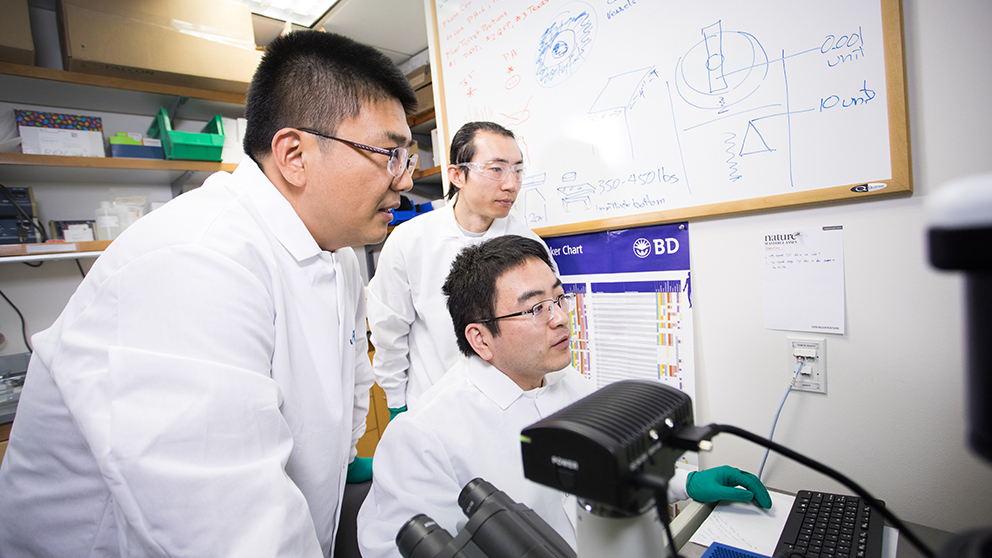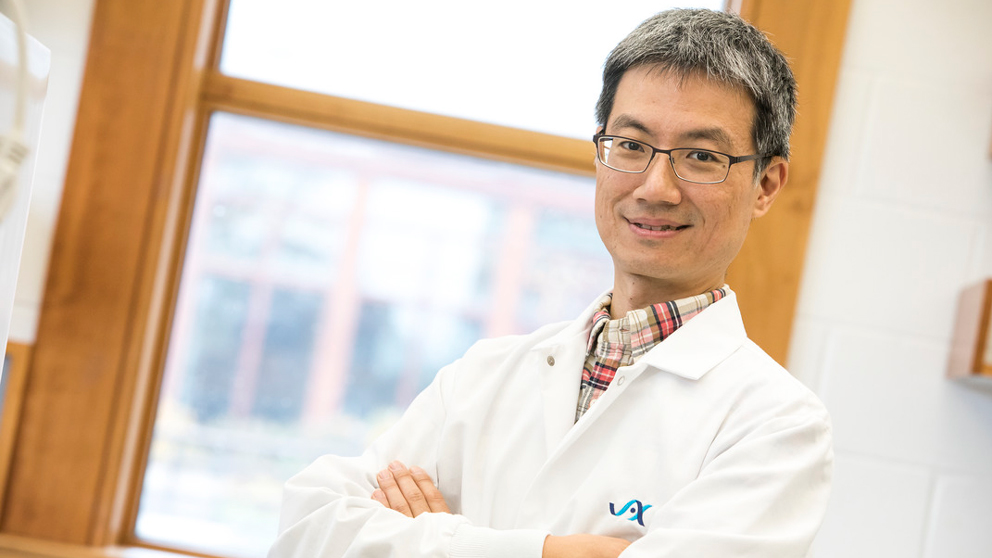
Cancer researcher Gary Ren (left) and his team at The Jackson Laboratory in Maine.
Cancer is a master of stealth. It’s one of the main reasons cancer is so darn hard to cure.
Cancer cells create their own little world inside of us, a microenvironment that protects and nourishes them to our detriment. But new technology is allowing us to figure out how cancer is so adept at hiding in the shadows of our body, shedding light on how to expose, target and kill it.
In what way is cancer so stealthy? The fact is, most cancer cells aren’t.
The body has effective systems to detect and eliminate abnormal cells, including those that divide and grow unchecked, the hallmark of cancer. Our immune system typically makes short work of these cells, just as it does of invading microbes like bacteria and viruses. But in some instances, the changes in the DNA of a cell will not only allow it to divide quickly, but it will also allow it to evade immune surveillance as well. One scientist called it “the great escape,” and the evasion of immune response is a critical factor in cancer cell proliferation. Thus the cells can keep dividing and growing free from attack, and they eventually form a tumor.
Something as large and unusual as a cancerous tumor in the body would typically send immune alarm bells ringing loudly. But by the time a tumor forms, it’s not just free from immune response, it actually hijacks immune cells for its own purposes. In fact, immune cells called tumor-associated macrophages are actually recruited to the tumor site. Macrophages are white blood cells that normally protect the body by ingesting foreign material, including disease-causing microbes. But when they become associated with a tumor, they help set up its microenvironment in several different ways. They send out molecular signals that further cloak cancer cells from normal immune cells. Different signals also help the tumor generate new blood vessels, needed for their tremendous energy needs, and fuel further growth into the surrounding tissues. Many other cells are altered by cancer, but the tumor-associated macrophages play vital roles, and prognosis worsens when there are many of them.
And so the tumor continues to grow, not just undisturbed but actually helped by cells and tissues in its microenvironment. It’s difficult to avoid thinking of cancer as smart because it employs so many surprising and sophisticated processes as it commandeers its surroundings. The main reason for this is rapid adaptation, as the cells divide quickly and frequently acquire new DNA mutations, some of which provide advantages that fuel even further growth.
Invading the microenvironment
Where can we turn against such a formidable foe? Biomedical research is a multi-tiered process, and the first step is to understand the tumor microenvironment in more detail. Two researchers at The Jackson Laboratory in Bar Harbor are working in just that area. Their work is delving into the intricate details of how tumors interact with their surroundings, including the immune cells that are so important in both tumor progression and for new therapies. Guangwen "Gary" Ren, Ph.D.To study tumor microenvironment and tumor immunology in cancer therapeutic resistance and metastatic relapseAssistant Professor Gary Ren, Ph.D., is investigating how specialized cells change within the tumor microenvironment, including macrophages and immune cells called neutrophils, which are essential for fighting infections. Ren’s goal is to understand how the tumor microenvironment affects metastasis and therapy response, including the new immunotherapies that have attracted so much attention over the past few years. His findings will help improve the effectiveness of treatments in part by showing why current therapies sometimes don’t work.
Chih-Hao "Lucas" Chang, Ph.D.We love to study metabolic events in immune cells and tissue microenvironments that govern their immune function and contribute to disease outcomes. Assistant Professor Lucas Chang, Ph.D., has a somewhat broader focus—he looks at the molecular mechanisms that control immune cell behavior during the development of various diseases—but he focuses on a type of immune cell that interacts with macrophages, known as T cells. In the tumor microenvironment, T cells undergo metabolic changes that suppress their ability to kill cancer cells. (See how smart cancer cells appear to be?) Figuring out how metabolic reprogramming aids tumor growth and figuring out how to prevent it would make immunotherapies far more effective for more patients. Chang’s work may also have implications for vaccines and the development of other drugs that target immune metabolism.

Cancer researcher Lucas Chang.
Killing a “smart” foe
The next step is bringing such research discoveries into the clinic. Doctors are already piercing the defenses of tumors in many patients, providing them with hope when there previously was none. But there is still work to do.
Most therapies over the past several decades have depended on cancer’s rapid growth, killing all cells that divide rapidly. Unfortunately, those include healthy cells in hair follicles and lining the intestine, among others, leading to sometimes devastating side effects. And seldom can all cancer cells be killed en masse by a single therapy, so recurrence was common. Breaching cancer’s defenses has required new thinking and better understanding. And over the past few years, more advanced treatments have been developed using two main strategies.
The first involves therapies that target specific mutations and growth pathways identified by genetic testing. Figuring out what drives tumor growth provides the ability to shut it down. For example, lung cancer patients with mutations in a specific gene now have a therapy available that effectively shuts down the cancerous activity of that mutation. Unfortunately, the targeted therapies only work in particular patient subgroups—for example, fewer than 5% of lung cancer patients have the mutation that can be treated. Also, in many patients, some of the cancer cells still evade destruction. But targeted therapies have improved outcomes for many patients, including through the Maine Cancer Genomics Initiative (MCGI), a unique alliance of cancer experts, clinicians and researchers from The Jackson Laboratory. MCGI is focused on improving outcomes for cancer patients throughout Maine by providing them with access to the latest genetic tests. And with further development, these therapies will benefit many more people.
The other strategy is immunotherapy, in which our immune systems are tweaked in ways that stimulate immune attacks on tumors despite their formidable cloaking strategies. Immunotherapy usually takes one of two forms. There are so-called checkpoint blockades, which take away one of the “brakes” on immune function, making it much more likely for tumors to be detected and destroyed through normal immune function. There is also a procedure called CAR-T, in which certain immune cells are removed from the patient’s body, primed to attack specific tumor features, such as unusual proteins, then injected back into the body to attack and kill the tumor. Each has achieved spectacular successes in patients that had cancers previously considered to be incurable.
The success stories of cancer immunotherapy have been somewhat offset by some serious failures, however. Many patients don’t respond, and some respond too well, as the immune activation extends far beyond the tumor to spark an acute, sometimes fatal autoimmune response. There have even been indications that the composition of a person’s gut microbiome—the microbes that live in our intestines—can have an effect on how well immunotherapies work. Nonetheless, immunotherapy is regarded as the most exciting recent development in cancer medicine, and with more insight, it too will help ever more significant numbers of cancer patients moving forward.
Charting a bright future
We now know how to take away a tumor’s defenses some of the time. But we still need to know more. The work of researchers like Ren, Chang and many more is crucial for gaining a more complete understanding of how cancer functions, and how to kill our elusive foe. But as their work is brought to oncologists, and as more and more effective therapies become available, cancer care as we know it will change forever to the benefit of patients everywhere.